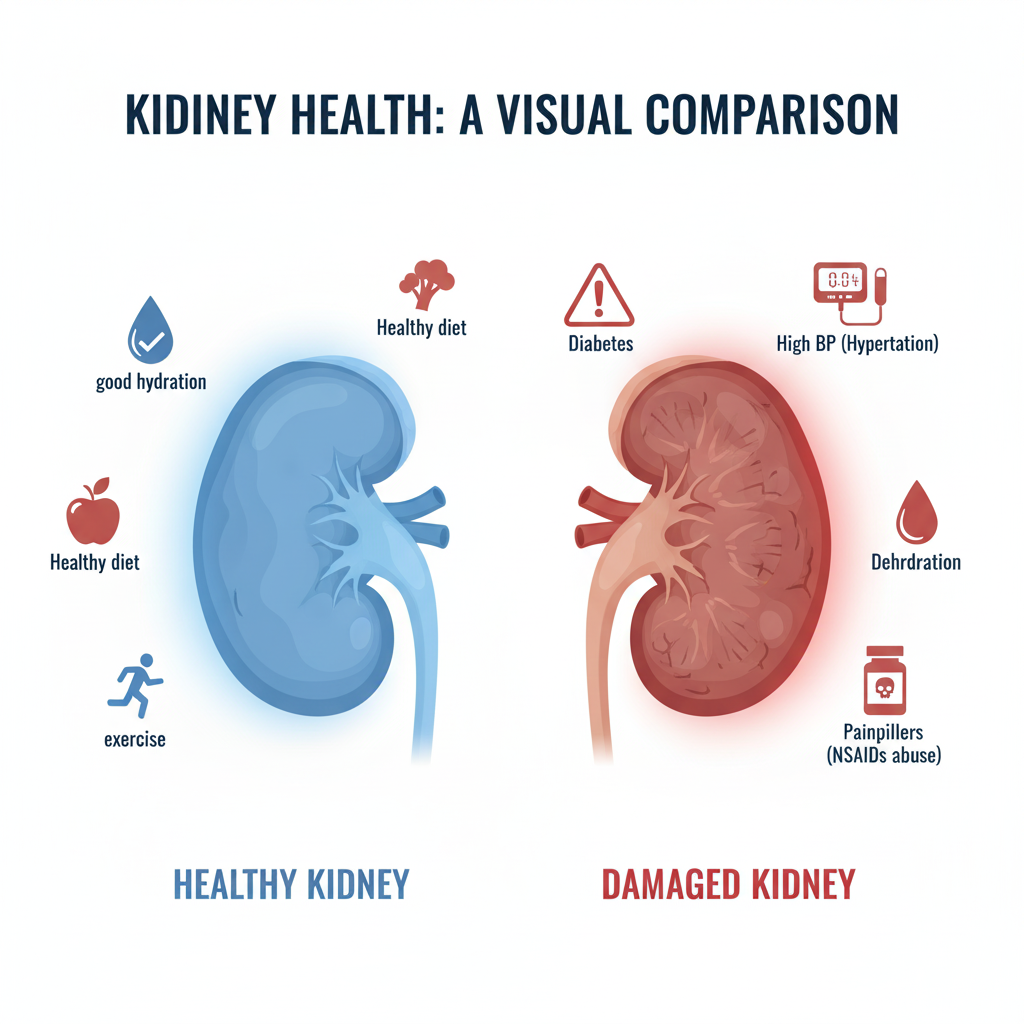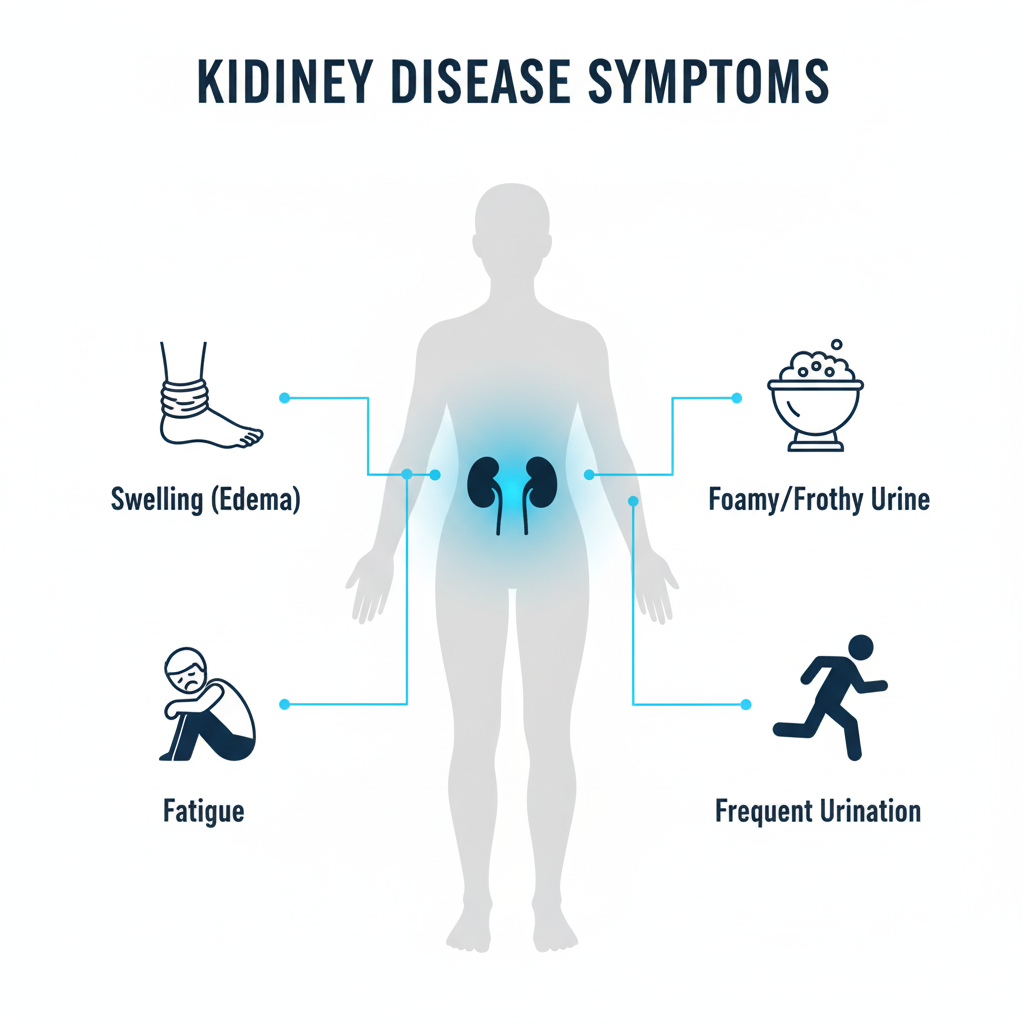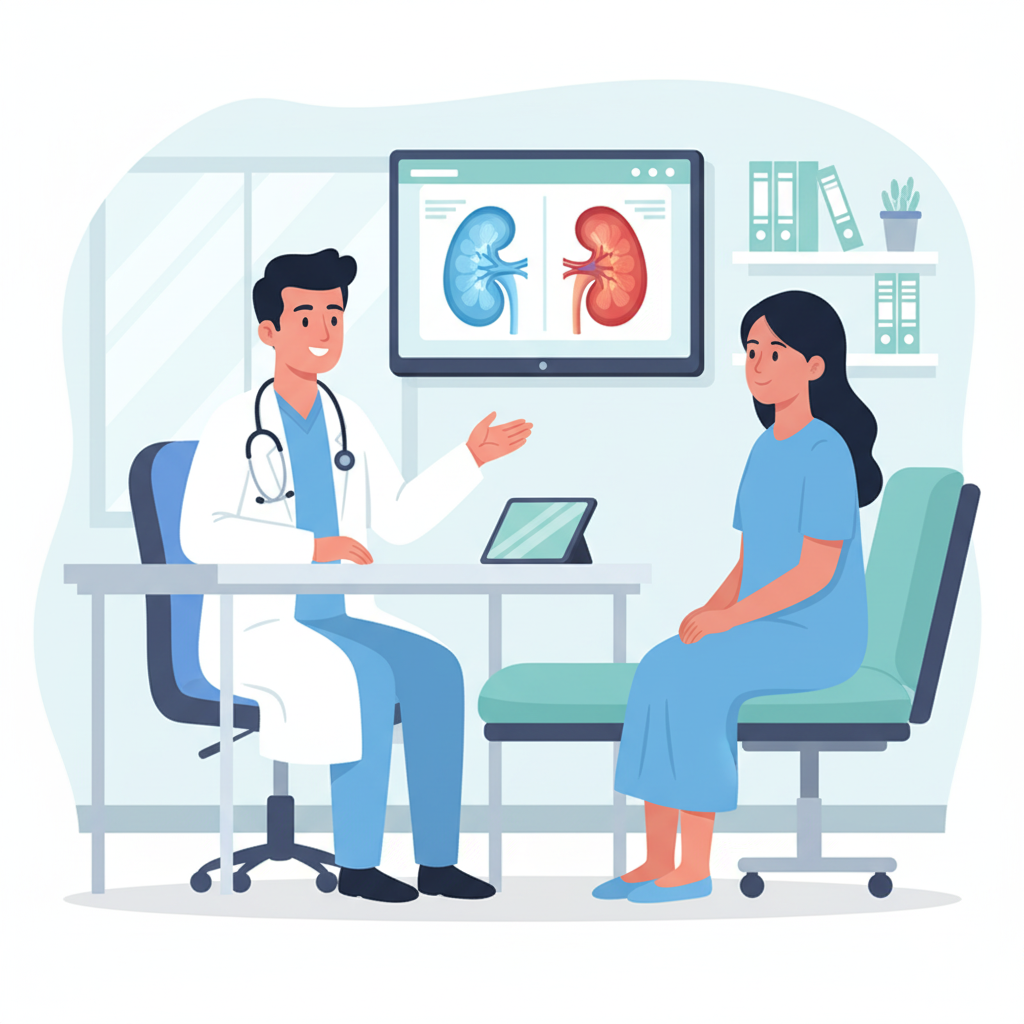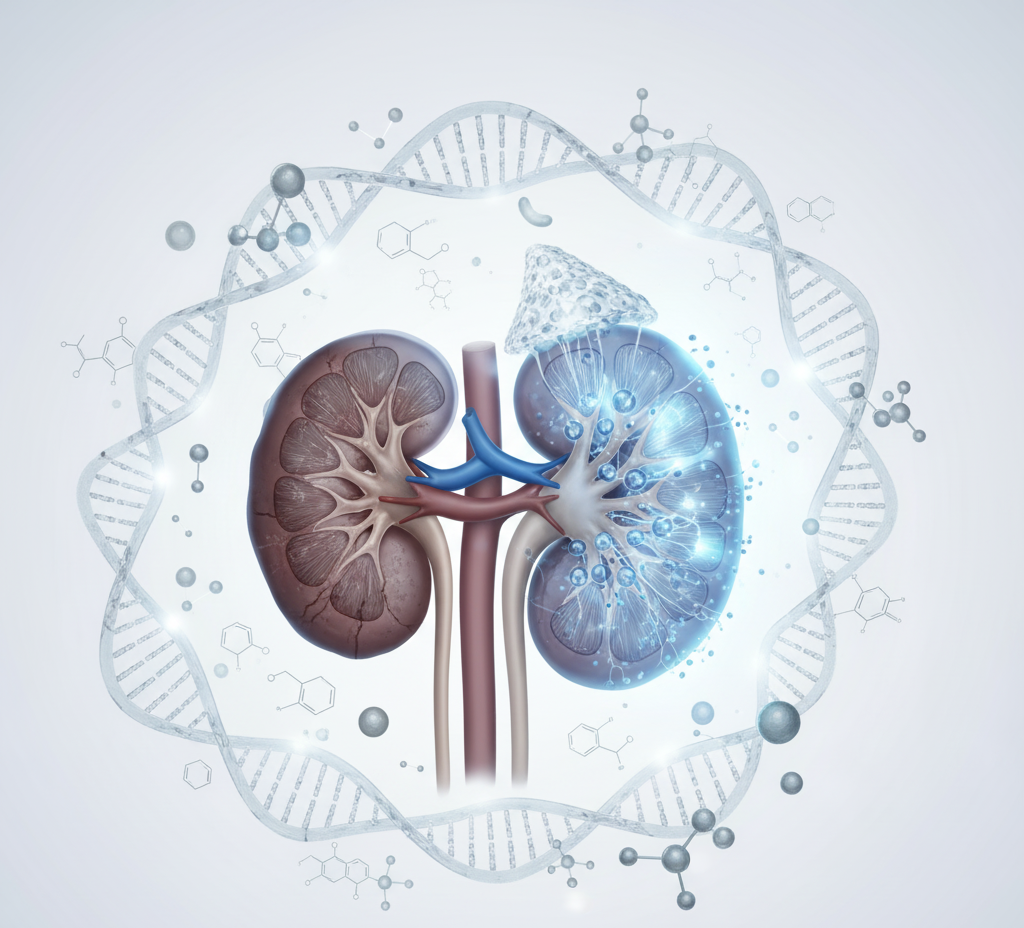Introduction
Chronic kidney disease (CKD) is growing at an alarming rate in India, affecting more than 1 in 5 adults. For decades, kidney disease was considered permanent — once the tiny filters (nephrons) were damaged, they were thought to be gone forever. That meant long-term medication, dialysis, or transplant as the only options.
But for the first time, scientists worldwide have discovered “simple” biological mechanisms that can trigger kidney repair, raising the possibility of reversing certain types of kidney damage. While this is not a full cure yet, it represents the biggest scientific leap in kidney health in decades.
These discoveries involve:
-
Activating natural kidney repair pathways
-
Reducing inflammation at the nephron level
-
Using stem cells to regenerate damaged areas
-
Blocking scarring (fibrosis)
-
Helping the gut microbiome heal the kidneys
-
Gene-editing tools to slow or block damage
This blog explains the breakthroughs in simple, everyday language — including what works today, what’s coming soon, and how long before we see a real cure.

Why Kidney Damage Happens: A Quick Overview
Your kidneys filter your blood, remove waste, balance minerals, and regulate blood pressure. Damage happens when these filters get inflamed, scarred, or overworked.
Common kidney risk factors in India include:
-
High blood pressure
-
Long-term painkiller use
-
Recurrent dehydration
-
High-salt diet
-
High-sugar diet
-
Obesity
-
Smoking
-
Alcohol
-
Kidney infections
-
Family history
These risk factors weaken the nephrons gradually until kidney function drops.
What Scientists Mean by a “Simple” Way to Reverse Kidney Damage
When researchers say a “simple” method is being developed, it doesn’t mean:
-
A magic pill
-
Instant reversal
-
A cure available tomorrow
Instead, it means:
A biological process inside the kidney that can be turned ON or OFF easily, using small molecules, diet changes, microbiome adjustments, or stem-cell-derived factors.
The body already possesses tiny self-repair capabilities. Scientists are finally learning how to strengthen and control them.
In early research, activating this mechanism helped regenerate damaged kidney cells and reduce inflammation.
The Breakthroughs: How Kidney Damage Might Be Reversed
1. Kidney Regeneration Pathway Activation
Researchers found proteins that can “wake up” dormant kidney stem cells. These cells help repair minor nephron damage.
2. Stem Cell–Based Kidney Repair
Stem cells can reduce inflammation and encourage tissue regrowth. Clinical trials are underway in the US, Japan, China, and Europe.
3. Anti-Fibrosis Drugs
Fibrosis (scarring) is the biggest enemy of kidney repair. New drugs can slow or block scarring, making healing possible.
4. Microbiome Repair Therapy
Gut bacteria produce natural compounds that protect the kidneys. Improving gut health may improve kidney function.
5. Gene Editing (CRISPR)
Scientists are exploring edits that reduce kidney inflammation and prevent rapid deterioration.
6. Bio-Artificial Kidneys
Portable artificial kidneys and implantable bio-kidney prototypes are being developed.
None of these are full cures yet, but progress is accelerating.
Can Kidney Damage Actually Be Reversed?
Here’s the truth in simple language:
Damage That CAN Be Improved
-
Early diabetic kidney changes
-
Inflammation
-
Toxin-related injury
-
Dehydration-related injury
-
Mild scarring
-
Kidney infections (if treated early)
Damage That CANNOT Be Reversed Yet
-
Advanced scarring
-
Severely damaged nephrons
-
End-stage renal disease
-
Long-term uncontrolled diabetes damage
-
Kidneys shrunk below normal size
Most scientific breakthroughs focus on early to moderate damage, not advanced-stage failure.
When Is the Cure Coming? Realistic Timeline
Here’s what global research suggests:
| Treatment Type | Expected Availability |
|---|---|
| Inflammation-blocking therapies | Already available in some regions |
| Microbiome-based kidney repair | 3–5 years |
| Stem cell–based kidney repair | 5–10 years |
| Anti-fibrosis reversal drugs | 5–7 years |
| Gene therapies | 10+ years |
| Fully bio-artificial kidney | 8–12 years |
A complete cure may still be years away, but major improvements in treatment will arrive much sooner.

Early Symptoms of Kidney Damage
Many people have kidney disease without knowing it. Early signs include:
-
Swelling in legs, feet, or face
-
Foamy or bubbly urine
-
Blood in urine
-
Back or side pain
-
Fatigue and weakness
-
Loss of appetite
-
Nausea or vomiting
-
Frequent urination
-
High blood pressure
-
Dark-colored urine
If you notice these symptoms, consult a doctor quickly.
Diagnosis
You may undergo tests like:
-
Serum creatinine
-
eGFR
-
Urine protein test
-
Urine ACR
-
Ultrasound
-
CT scan
-
Kidney biopsy (rare cases)
Early diagnosis improves the chances of slowing or reversing damage.
ALSO READ: Colon Cancer: 7 Ultra-processed Foods You Should Avoid To Reduce The Risk
Current Treatment Options
While a cure is not yet available, treatment focuses on:
-
Controlling diabetes
-
Managing blood pressure
-
Reducing salt intake
-
Limiting protein in diet (when needed)
-
Monitoring potassium and phosphorus
-
Treating infections early
-
Avoiding unnecessary painkillers
-
Using kidney-protective medicines
-
Dialysis in later stages
-
Kidney transplant for severe failure
These treatments protect remaining kidney function.
Lifestyle Tips for Better Kidney Health
-
Drink enough water (unless doctor limits fluids)
-
Reduce salt
-
Eat more fruits and vegetables
-
Eat whole grains
-
Avoid packaged and junk foods
-
Stay active
-
Sleep properly
-
Reduce alcohol and smoking
-
Maintain a healthy weight
-
Manage stress
Small daily changes create long-term protection.
Prevention Tips
-
Annual kidney function tests
-
Controlled sugar and blood pressure
-
Adequate hydration
-
Avoid painkillers unless necessary
-
Avoid excess protein supplements
-
Manage anemia and thyroid issues
-
Eat kidney-friendly foods
-
Seek early treatment for infections
Prevention remains the best strategy.

When to See a Doctor
See a doctor if you have:
-
Persistent swelling
-
Frothy urine
-
Blood in urine
-
Poor appetite
-
Fatigue without reason
-
During diabetes or BP checkups
-
Family history of kidney disease
-
Repeated UTIs
-
Kidney stone history
Early intervention saves kidneys.
Risks and Complications of Untreated Kidney Damage
-
Heart disease
-
Severe swelling
-
High blood pressure
-
Nerve damage
-
Weak bones
-
Fluid overload
-
Infections
-
Kidney failure requiring dialysis
-
Life-threatening complications
Never ignore kidney symptoms.
50 FAQs About Kidney Health and Kidney Repair
-
Can kidney damage be reversed?
Mild to moderate damage can improve; severe scarring cannot. -
Is a full cure coming soon?
Research is promising, but a complete cure may take years. -
What helps kidneys heal naturally?
Hydration, low-salt diet, blood sugar control, and inflammation reduction. -
Do kidneys regenerate?
Yes, but regeneration is limited. -
Can drinking water repair kidneys?
It prevents further injury but doesn't reverse major damage. -
What food is best for kidneys?
Fruits, vegetables, whole grains, and low-salt meals. -
Are painkillers harmful?
Long-term NSAIDs can damage kidneys. -
Does diabetes cause kidney failure?
Yes, it's the leading cause in India. -
Is BP harmful to kidneys?
High BP damages kidney blood vessels. -
Do kidneys fail suddenly?
Acute kidney injury happens suddenly; CKD is slow. -
What is eGFR?
A measure of kidney function. -
Can dehydration cause kidney damage?
Yes, severe dehydration can injure kidneys. -
Can kidney disease be silent?
Yes, symptoms appear late. -
Are kidney infections dangerous?
Yes, untreated infections cause permanent damage. -
Is excessive protein harmful?
Yes, especially in CKD patients. -
Do supplements help kidney repair?
Take only doctor-approved supplements. -
Can kidney stones cause kidney damage?
Yes, if they block urine flow. -
Are stem cells a cure?
Not yet, but promising. -
Is a kidney transplant permanent?
Transplanted kidneys last 10–20 years. -
Can yoga support kidney health?
Yes, by reducing BP and stress. -
Can alcohol damage kidneys?
Yes, heavy use harms kidneys. -
Is salt harmful for kidneys?
Excess salt increases BP and kidney stress. -
What is kidney fibrosis?
Scarring that prevents healing. -
Can fibrosis be reversed?
Not fully yet, but new drugs are coming. -
Is dialysis painful?
Most patients tolerate it well. -
Can CKD be detected early?
Yes, with urine and blood tests. -
Can Ayurveda help?
May relieve symptoms; not a cure. -
Can genetics cause kidney issues?
Yes, genetic conditions like PKD cause CKD. -
Can stress harm kidneys?
Indirectly, through BP increase. -
Does obesity affect kidneys?
Yes, it increases disease risk. -
Is smoking bad for kidneys?
Very harmful. -
Can kids develop CKD?
Yes, due to infections or congenital issues. -
Can water flush toxins?
Yes, but only healthy kidneys can filter properly. -
Are kidney problems reversible in children?
Often more reversible than in adults. -
What color urine indicates kidney issues?
Dark, foamy, or blood-tinged urine. -
Can back pain be a kidney symptom?
Yes, especially flank pain. -
Are UTIs linked to kidney disease?
Yes, recurrent UTIs can damage kidneys. -
How much water should I drink?
8–10 glasses unless doctor restricts. -
Can lemon water help?
It helps hydration but doesn’t repair kidneys. -
Can low BP harm kidneys?
Very low BP can reduce kidney blood flow. -
Can CKD patients exercise?
Yes, moderate exercise is helpful. -
Is dialysis a last option?
Yes, used when kidneys fail. -
Can kidney damage cause itching?
Yes, due to toxin buildup. -
Is frequent urination a kidney symptom?
Yes, it may indicate damage. -
Can CKD cause bone pain?
Yes, due to mineral imbalance. -
Do herbal teas help kidneys?
Some soothe digestion; not a cure. -
Is watermelon good for kidneys?
Yes, if potassium is normal. -
Can CKD patients eat bananas?
Only if potassium levels allow. -
Can anemia be due to kidney disease?
Yes, kidneys produce erythropoietin. -
Can kidneys heal after infection?
Yes, if treated early.
Conclusion
Kidney research is moving faster than ever. While a full cure is not yet available, scientists are discovering simple, natural biological pathways that may soon make kidney repair possible. Until then, early diagnosis, lifestyle changes, and proper medical care remain the strongest tools for protecting kidney health.
Quickobook CTA
Worried about kidney symptoms?
Book a kidney specialist (nephrologist) instantly on Quickobook
Fast appointments & online consultations available
Trusted doctors across India
Disclaimer
This blog is for educational purposes only. It does not replace professional medical advice. Always consult a qualified doctor for diagnosis and treatment.











Comments (0)
No comments yet. Be the first to share your thoughts!
Leave a Comment